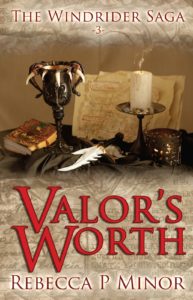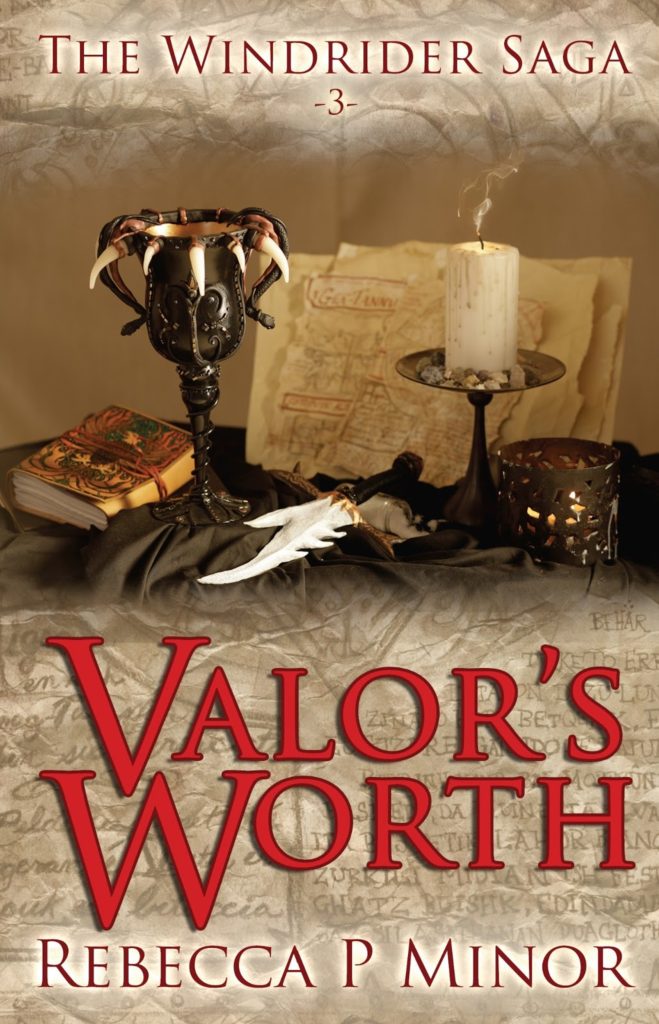‘Valor’s Worth’: Trusting The Lord With Our Traumas
 I loved the first two of Rebecca P. Minor’s Windrider Saga books, and had high expectations of this third book, Valor’s Worth. Suffice it to say, Minor did not disappoint.1
I loved the first two of Rebecca P. Minor’s Windrider Saga books, and had high expectations of this third book, Valor’s Worth. Suffice it to say, Minor did not disappoint.1
As the story begins, Lieutenant Commander Vinyanel Ecleriast and his group are on the way back from their adventures of the previous book when they intercept a letter to representatives of the Elven nation of Delsin (of which Vinyanel is a part). The letter asks if Vinyanel’s people will agree to a meeting with the remnants of the Elgadrim. The Lt. Commander sends most of the rest of his force home while he goes with his dragon friend, Majestrin, the prophetess Veranna, and the former assassin Hridayesh, to meet these Elgadrim.
At the same time, a newly-hatched dragonling, Iriscendra, who was accidentally bonded to Vinyanel while in her egg, goes off looking for him. When she finds him, she follows him everywhere, much to Majestrin’s dismay and annoyance. Of course, the young dragonling’s keeper, the Elf Maiden Raen from the previous book, goes looking for her with another young dragon named Mythrenese. All of these disparate people are together when the evil dragon-kin attack and cause havoc. The party members are in various states of injury and separated. Now they must find each other and set out in time to stop a horrific sacrifice designed to summon an evil force that could spell their doom.
I really enjoyed this story, as I said in the introductory paragraph. The only critiques I had were mainly four-fold.
First of all, the narrative started out really slowly. Until the fateful meeting of Raen and Vinyanel at the camp site, everything seemed to drag on and on. I think that a slightly faster pace amidst the set-up in the first part of the book would have helped enormously in this regard. I encourage anyone bored early on to keep on reading. It is worth it.
The second and third things are related. Mainly I didn’t like how a certain character died, as I liked that character, and I really, really did not like how another character, Raen, acted after that death. Due to the dead is a big thing with me, and Raen’s harsh, unforgiving, uncaring heart, didn’t demonstrate it. It really turned me against her. I know she had reason to be angry, and I’m not saying she isn’t a good character, but her attitude rubbed me the wrong way the rest of the novel to the extent that I just couldn’t care about her. Worse yet, no on called her out on her callousness.
The last part that annoyed me was Vinyanel’s hypocrisy. In the books, he has an emotional, “do the right thing and the rules be damned” attitude, and can be highly disrespectful with superiors. When it comes to lower-ranking folks with him, however, he is all about the respect due a superior and proper military decorum. What?! I can take this as a character failing of his, if it were ever addressed as such. But it’s not really pointed out by others beyond general rebukes over “rudeness.” Only near the end of the book is this mentioned, and even then, he looks like he’ll get off scot-free.
Despite these criticisms, I really was into this story, and think it is Minor’s best effort yet. I would contend that the first two books each had the opposite weaknesses and strengths. The first book, for instance, was written in very beautiful, almost poetic, prose, but was somewhat lacking in details. The second book, meanwhile, was chock-full of information about the world, characters, military, so on, but the prose seemed to be a bit “rougher”, if you will. This third volume had the best of both worlds with in-depth details and elegant writing.
I appreciated in the story how Minor fleshed out and (forgive the term, you know what I mean) “humanized” the dragons. They are not just plot conveniences, but real, thinking, believing, caring people. So many books, treat dragons, even the sapient ones, as glorified, extra-smart horses. Minor is to be praised for not doing this.
Beyond that, Valor’s Worth dealt with some important inter-connected themes, such as faith in God, dealing with trauma, and trusting the Lord to help us to persevere in hard situations in life.
This series is set in a world where the God-analogue (Creo) is there and protects His people, but doesn’t solve all of their problems for them. Instead, He works through people. Just as in the real world, people suffer and die, but their faith in God is what makes them able to withstand this. God has a plan, and we must trust Him to fulfill it. Trust in God is truly a major theme of the work. Not just with our physical problems, but with our emotional anguish, as well. As someone dealing with issues from Iraq, I like that Minor didn’t make Vinyanel’s war traumas either fake or easily gotten over. He has to trust Creo with these hurts (very real hurts) as well. They still hurt him. He is still affected by them, and probably always will be. The answer lies not in magically getting rid of pain, but learning how to deal with it and trusting God to help him do so.
This kind of dovetails into the final theme, from the title, which was knowing why we fight or endure bad things in life, and seeing the right thing through to the end. It connects because of the truth that crises, disasters, and other hard times are (or ought to be) far more bearable for those who truly trust God, Whom the Bible says will never leave or forsake us. He is with us always.
Valor’s Worth was a fun, edifying read. I can’t wait until Rebecca Minor releases her next book in the series.
Highly recommended.






































To steal an image from somewhere I can’t remember, I feel like we need an Oprah-figure to come and go “Therapy for you! Therapy for you! Therapy for you! Therapy for everybody!“
Timothy, I appreciated this review. Thank you for giving us a good look at the story, both the positive and negative, and adding your take on the central theme. Books should have impact, and it’s good to know this one did.
I appreciate the recommendation.
Becky